Friday’s jobs report was a complete stunner. The economy added 2.5 million jobs in May, the Labor Department announced, smashing expectations of millions more job losses, and the unemployment rate fell to 13.3%, down from 14.7% in April.
President Trump hailed the numbers, touting them as an indication of a strong economic rebound from the coronavirus pandemic, a salve that would heal the racial tensions on display across the country over the last week and “affirmation of all the work we’ve been doing, really for three and a half years.”
“Today is probably, if you think of it, the greatest comeback in American history,” Trump said at a hastily arranged news conference in the White House Rose Garden.
Trump celebrates ‘a very big day for our country’: “This is better than a V,” Trump said about widespread prognostications about whether the economic recovery would be shaped like a V, a U, a W or even a Nike swoosh. “This is a rocket ship. This is far better than a V.”
The president spoke for nearly an hour, and his rambling remarks covered a lot of territory — a whole lot — but were mostly a victory lap centered around the jobs numbers and how they could fix what seems broken in the country, including the protests sparked by the killing of George Floyd in Minneapolis police custody. “Hopefully George is looking down right now and saying, ‘This is a great thing that’s happening for our country.’ This is a great day for him. It’s a great day for everybody,” Trump said.
What does this mean for the next coronavirus relief bill? Trump said Friday that he’ll still pursue additional stimulus money, “despite the numbers and how good they are.” He also said he would push for a payroll tax cut, a proposal that many lawmakers and economists have greeted with skepticism, saying it’s unlikely to deliver help to those who need it most. Trump said that a payroll tax cut would be a “tremendous incentive” for businesses and workers. And he said he’d seek targeted aid for restaurants and parts of the entertainment industry.
Still, the stronger-than-expected jobs numbers will almost certainly diminish the chances for another large coronavirus relief bill. "This definitively kills any chance of trillions of new spending," one Senate Republican aide said, according to The Washington Post’s Jeff Stein, who also reported that White House economic advisers Art Laffer and Stephen Moore said that the jobs report shows Congress can hold off on new stimulus spending. “The sense of urgent crisis is very greatly dissipated by the report,” Moore told the Post.
Even before Friday’s jobs report, Post reported that the president was reluctant to pursue a new stimulus package, citing White House officials and Trump advisers. Conservatives have reportedly urged Trump to hold off on providing more money to states hit by the pandemic and focus instead on tax breaks for businesses as well as cutting regulations and the trade war with China, and the president is in no mood to work with Democrats who have criticized him for his responses to the pandemic and mass protests.
Trump’s opposition to additional stimulus “is privately seen as soft and pliable,” the Post’s Robert Costa and Ashley Parker write, and it could depend largely on the outlook for his reelection campaign against presumptive Democratic nominee Joe Biden.
“He could go from saying ‘I’ll do nothing more’ to saying ‘I’ll do $1 trillion more’ in a second if he thinks it helps him with beating Biden,” an unnamed Trump adviser told the Post.
Economists worry about a ‘nightmare scenario’: Some economists warn that celebrating one jobs report as evidence of an economic rebound could be premature — and could ultimately undermine a recovery if it reduces further stimulus efforts. “This is how one good jobs report can turn into a nightmare scenario,” Ernie Tedeschi, a Treasury economist during the Obama administration now at Evercore ISI, tweeted.
Months of extraordinarily strong job gains will be needed to get near the low unemployment levels the U.S. saw at the beginning of the year. Michael R. Strain, director of economic policy studies at the conservative American Enterprise Institute, tweeted that the 13.3% unemployment rate is “an economic and human disaster,” and that another coronavirus bill remains necessary. “Workers, families, and small businesses need Phase 4,” he said. “There’s no doubt about the need.”
Economists also point out that the unemployment numbers may reflect the massive fiscal support Congress has provided so far, particularly the Paycheck Protection Program of forgivable loans to small businesses, which likely helped fuel strong gain in the restaurant and retail sectors. “Many economists expected the PPP would be a big factor in June, but it turns out the impact was sizable in May,” the Post’s Heather Long explains. “Most economists look at these numbers and urge Congress and the White House to keep the PPP and other aid going. Most of the government relief money is slated to dry up by the end of July.”





